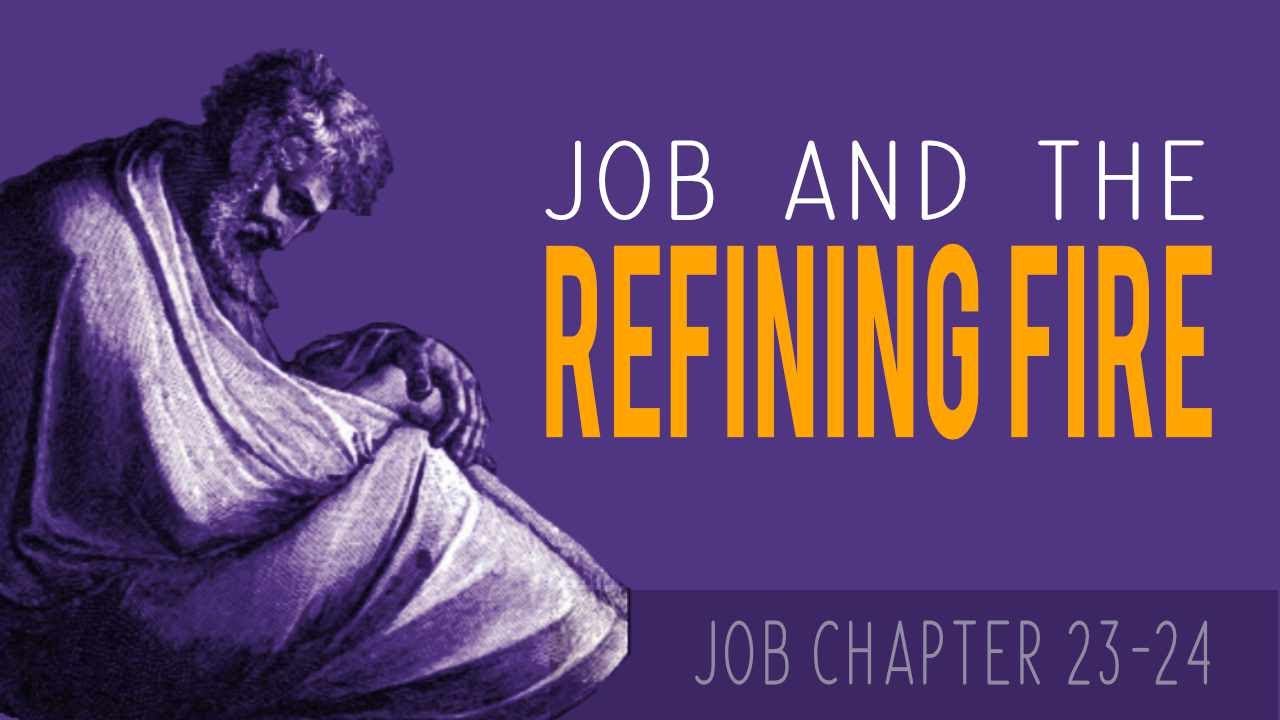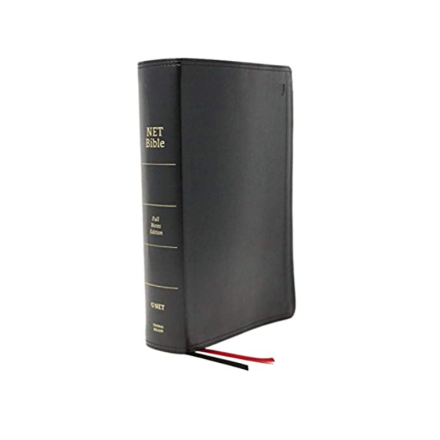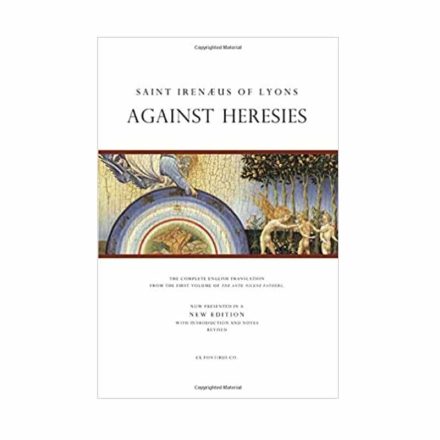Podcast (bible-study): Play in new window | Download | Embed
Subscribe: Apple Podcasts | Google Podcasts | Spotify | Amazon Music | Android | Pandora | iHeartRadio | Podchaser | Email | Deezer | RSS | More
“I shall be refined as gold” – Job 23-24

And he told them a parable to the effect that they ought always to pray and not lose heart. 2 He said, “In a certain city there was a judge who neither feared God nor respected man. 3 And there was a widow in that city who kept coming to him and saying, ‘Give me justice against my adversary.’ 4 For a while he refused, but afterward he said to himself, ‘Though I neither fear God nor respect man, 5 yet because this widow keeps bothering me, I will give her justice, so that she will not beat me down by her continual coming.’” 6 And the Lord said, “Hear what the unrighteous judge says. 7 And will not God give justice to his elect, who cry to him day and night? Will he delay long over them? 8 I tell you, he will give justice to them speedily. Nevertheless, when the Son of Man comes, will he find faith on earth?[1]”
Jesus told his followers to persist, to not give up, to keep seeking justice from God, and that is what we see Job doing. As we discussed in last week’s lesson on Job chapter 22 which was Eliphaz’s third and last response, chapter 22 marks a shift. Eliphaz’s response in chapter 22 begins with an insistence that there is some fault in Job and the last part is a description of God’s judgment of the wicked. It is a condemnation of the unrighteous who seemingly are not called to account. At the middle of the 42 chapters of Job, I think this is the kernel of the message of the writer of Job. It was a message to an oppressive ruler who seemed to live a life of ease and luxury. The message is in the end, you will receive your absolutely just reward. Job responds to Eliphaz beginning with a plea to God.
Job 23 Then Job answered and said: 2 “Today also my complaint is bitter;
my hand is heavy on account of my groaning.
3 Oh, that I knew where I might find him,
that I might come even to his seat! 4 I would lay my case before him
and fill my mouth with arguments.
5 I would know what he would answer me
and understand what he would say to me. 6 Would he contend with me in the greatness of his power?
No; he would pay attention to me.
7 There an upright man could argue with him,
and I would be acquitted forever by my judge.
Job is crying out to God and proclaiming his trust in the God who is not only just, but who is faithful. In chapters 16-17, Job states that he knows he has a mediator, one who is interceding for him as for a friend. In chapter 19, Job tells us that he “knows his Redeemer lives.” But now, Job is going even farther. He knows that there is One who is pleading his case and working on his behalf, but Job wants to plead his case to God. He wants a one-on-one relationship with God. How far Job has come since his first response in chapter 3 during his dark night of the soul!
8 “Behold, I go forward, but he is not there,
and backward, but I do not perceive him;
9 on the left hand when he is working, I do not behold him;
he turns to the right hand, but I do not see him.
10 But he knows the way that I take;
when he has tried me, I shall come out as gold.
Job is seeking God, but he has not found him … yet. But still he presses forward, he recognizes that God is active and working preparing the path that Job will take and even though Job does not yet have an answer, he will continue to believe in the goodness that God has for him. Not only does Job believe that God has good for him, but he recognizes that God will make him good. That through these trials, he is being purified and refined, and in the end he will “come out as gold.” David writes the same thing of his own trials in Psalm 66
8 Let the whole world bless our God
and loudly sing his praises.
9 Our lives are in his hands,
and he keeps our feet from stumbling. 10 You have tested us, O God;
you have purified us like silver.
11 You captured us in your net
and laid the burden of slavery on our backs.
12 Then you put a leader over us.
We went through fire and flood,
but you brought us to a place of great abundance.[2]
Sometimes it is the very thing that seems like the calamity that brings about that “place of great abundance” and we would not be able to come to or handle that abundance if it weren’t for the refining process. Isaiah calls that refining process the “furnace of aflliction” in Isaiah 48.
8 “Yes, I will tell you of things that are entirely new,
things you never heard of before.
For I know so well what traitors you are.
You have been rebels from birth.
9 Yet for my own sake and for the honor of my name,
I will hold back my anger and not wipe you out.
10 I have refined you, but not as silver is refined.
Rather, I have refined you in the furnace of suffering.
11 I will rescue you for my sake—
yes, for my own sake!
I will not let my reputation be tarnished,
and I will not share my glory with idols![3]
In this passage Isaiah, writing the Lord’s words to the Israelites, tells them that God will keep his covenant promise to them for the glory of his own name, in spite of the fact that they have been “rebels from birth.” Israel is being put through a refining process, but God will rescue them because he is faithful.
11 My foot has held fast to his steps;
I have kept his way and have not turned aside.
12 I have not departed from the commandment of his lips;
I have treasured the words of his mouth more than my portion of food.
13 But he is unchangeable, and who can turn him back?
What he desires, that he does.
14 For he will complete what he appoints for me,
and many such things are in his mind. 15 Therefore I am terrified at his presence;
when I consider, I am in dread of him.
16 God has made my heart faint;
the Almighty has terrified me;
17 yet I am not silenced because of the darkness,
nor because thick darkness covers my face.
We’ve discussed before that part of the difficulty in understanding Job can be the translations themselves. Sometimes the way a passage is translated is heavily influenced by the translator’s theological doctrines and preconceptions. This can cause slight shifts in the meaning of the passages. I think we see this again in the last part of Job 23.
Reading this section from the ESV alone, it seems as if Job believes that God is the one who is coming after him and doing the afflicting. In the West, we have a tendency to think of anything to do with the spiritual world as only us and God, nothing else. But we saw in the beginning of the book of Job that is not the case. We are explicitly told in the first two chapters that it was Satan who was doing the afflicting. This comes across to me a little differently in Young’s Literal Translation:
13 And He [is] in one [mind], And who doth turn Him back? And His soul hath desired — and He doth [it]. 14 For He doth complete my portion, And many such things [are] with Him. 15 Therefore, from His presence I am troubled, I consider, and am afraid of Him. 16 And God hath made my heart soft, And the Mighty hath troubled me. 17 For I have not been cut off before darkness, And before me He covered thick darkness.
Job is acknowledging that God sets the course for his life and that what God has appointed for him will come to pass. It is this greatness and majesty that has made Job’s heart faint. As the writer of Hebrews states, “it is a terrifying thing to fall into the hands of a living God.[4]” The NET commentator explains verse 17 in this way:
This is a very difficult verse. The Hebrew text literally says: “for I have not been destroyed because of darkness, and because of my face [which] gloom has covered.” Most commentators omit the negative adverb, which gives the meaning that Job is enveloped in darkness and reduced to terror. The verb נִצְמַתִּי (nitsmatti) means “I have been silent” (as in Arabic and Aramaic), and so obviously the negative must be retained—he has not been silent.[5]
Job is in distress, the darkness, but he continues to cry out to God. This passage reminds me of Psalm 138:8 where David writes:
The LORD will perfect that which concerns me; Your mercy, O LORD, endures forever; Do not forsake the works of Your hands.[6]
We continue to Job chapter 24 where Job continues to point out wrongdoing and asking why God doesn’t act. I think this is another indication that the writer of the book of Job was speaking to specific circumstances, condemning an oppressive ruler and the wrongdoing that ruler allowed to continue.
Job 24 “Why are not times of judgment kept by the Almighty,
and why do those who know him never see his days?
2 Some move landmarks;
they seize flocks and pasture them. 3 They drive away the donkey of the fatherless;
they take the widow’s ox for a pledge.
4 They thrust the poor off the road;
the poor of the earth all hide themselves. 5 Behold, like wild donkeys in the desert
the poor go out to their toil, seeking game;
the wasteland yields food for their children.
6 They gather their fodder in the field,
and they glean the vineyard of the wicked man. 7 They lie all night naked, without clothing,
and have no covering in the cold.
8 They are wet with the rain of the mountains
and cling to the rock for lack of shelter. 9 (There are those who snatch the fatherless child from the breast,
and they take a pledge against the poor.)
10 They go about naked, without clothing;
hungry, they carry the sheaves; 11 among the olive rows of the wicked they make oil;
they tread the winepresses, but suffer thirst.
12 From out of the city the dying groan,
and the soul of the wounded cries for help;
yet God charges no one with wrong.
In this first section of Job chapter 24, Job is agreeing with Eliphaz’s words in chapter 22 that these are things which should bring about judgment. However, he is pointing out that these things are going on and the wicked are not judged.
13 “There are those who rebel against the light,
who are not acquainted with its ways,
and do not stay in its paths. 14 The murderer rises before it is light,
that he may kill the poor and needy,
and in the night he is like a thief. 15 The eye of the adulterer also waits for the twilight,
saying, ‘No eye will see me’;
and he veils his face. 16 In the dark they dig through houses;
by day they shut themselves up;
they do not know the light.
17 For deep darkness is morning to all of them;
for they are friends with the terrors of deep darkness.
Job describes those who are so corrupt in spirit that they welcome the darkness, those who “rebel against the light.”
18 “You say, ‘Swift are they on the face of the waters;
their portion is cursed in the land;
no treader turns toward their vineyards. 19 Drought and heat snatch away the snow waters;
so does Sheol those who have sinned.
20 The womb forgets them;
the worm finds them sweet;
they are no longer remembered,
so wickedness is broken like a tree.’
21 “They wrong the barren, childless woman,
and do no good to the widow. 22 Yet God prolongs the life of the mighty by his power;
they rise up when they despair of life.
23 He gives them security, and they are supported,
and his eyes are upon their ways. 24 They are exalted a little while, and then are gone;
they are brought low and gathered up like all others;
they are cut off like the heads of grain. 25 If it is not so, who will prove me a liar
and show that there is nothing in what I say?”
In the last section of chapter 24, Job points out that sometimes the wicked seem to go unpunished, but in the end they will get what they deserve. That regardless of whether or not they seem to prosper in this life, everyone dies in the end and there will be a judgment. But let’s return to the first part of Job’s response. If everyone dies in the end, what is the point of it all? The point is, that this is not the end. God is just and faithful and when all are called to account, how we used the blessings and resources God gave us will determine our rewards. This is the point of many of Jesus’s parables such as the Parable of the Talents and the Parable of the Unjust Steward. God gives us the latitude to make actual decisions so we can receive actual rewards for those decisions that we make. If we choose to misuse power and influence when they are given to us, we will be judged. But why Job? Why did God allow Satan to afflict Job with these trials? I think sometimes it may be because God knows that this trial will bring about a greater end. The key verse in this section is Job 23:10:
10 But he knows the way that I take;
when he has tried me, I shall come out as gold.
Even good and well-meaning people can get full of themselves and get off on the wrong path. Solomon is a perfect example of this. Balaam and the man of God are two others. Sometimes God puts obstacles in our way and allows us to go through trials because he knows that otherwise, without going through that lesson and refining process, we would get ourselves into a mess. God’s abundant blessings were always in his plan for Job’s life. Without Job’s firsthand experience of being poor, destitute, and abandoned, would he have maintained that faith in and faithfulness to God, or would he have actually become what Eliphaz condemned.
This Bible study is part of A Study of Job (2021)




